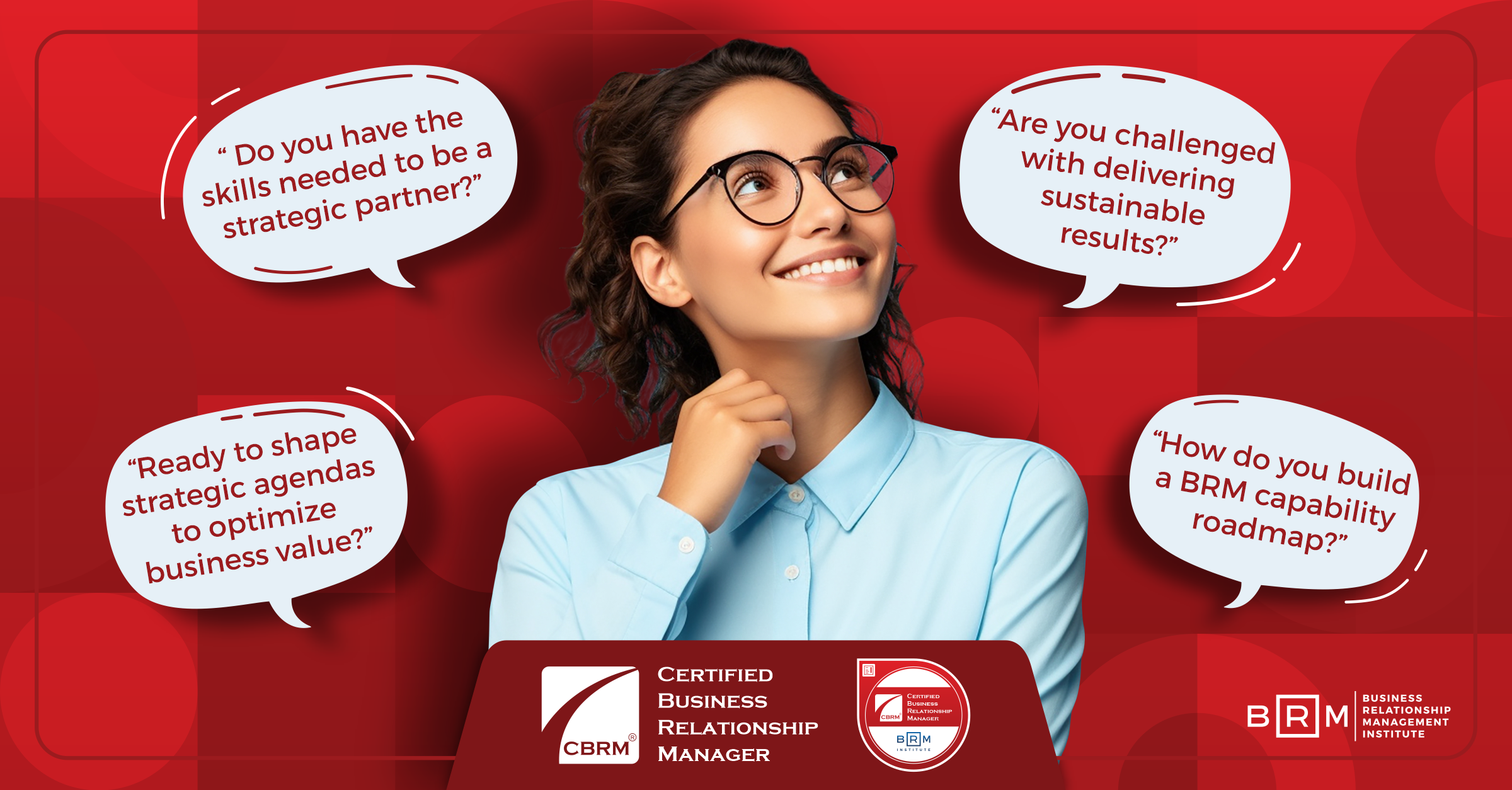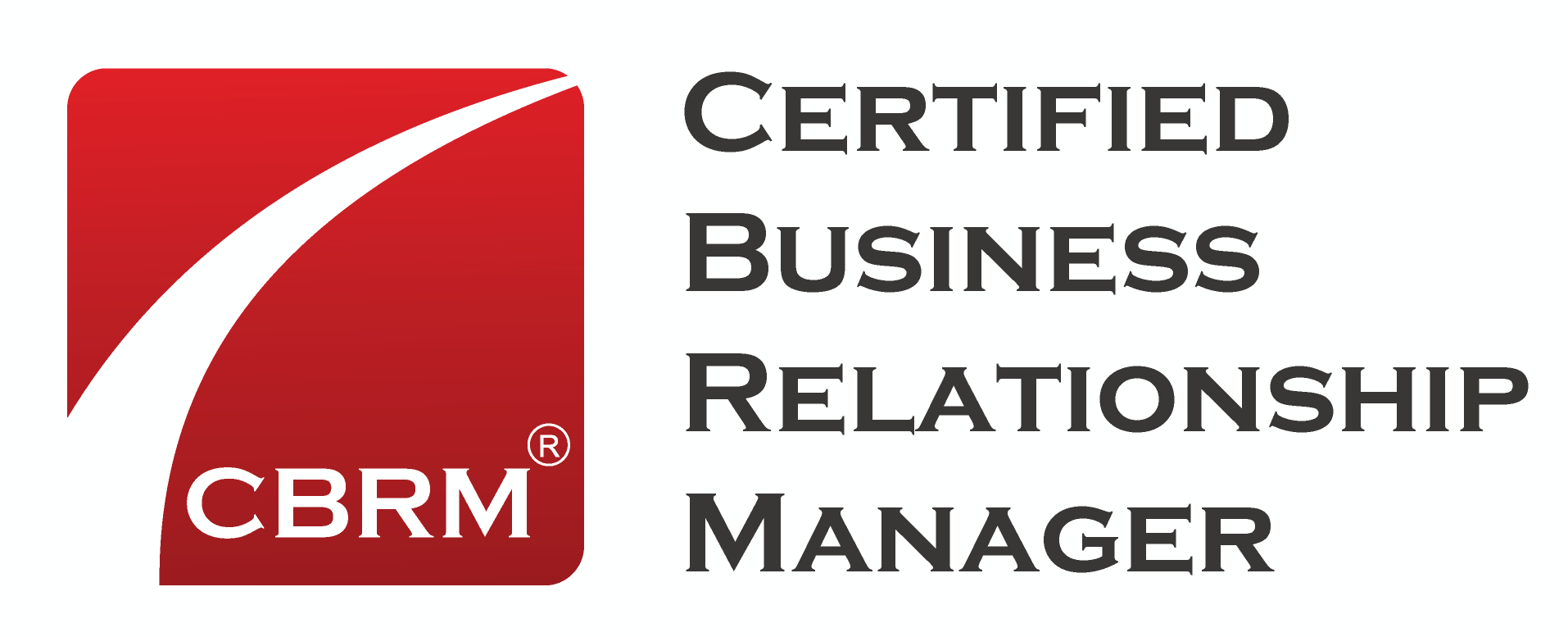Certified Business Relationship Manager (CBRM®)

The CBRM® Practitioner Credential is designed to advance your professional skills to that of a strategic partner within your organization.
The primary focus of this course centers on strategic business relationship management such as how to leverage organizational capabilities and optimize value by strengthening your organization’s relationship network. This course is designed for intermediate experience level BRMs, or anyone managing strategic relationships including HR leaders, BRM team leaders, project managers and those who are responsible for the continuous growth and improvement of their organization, their partner network, and overall capabilities through the maturity and quality of relationship capital.
Unlike other practitioner training methodologies, the CBRM® offers real-world application and a tailored approach to strategic relationship building, executive engagement, convergence of strategic goals, and positions leaders to innovate in ways that positively impact the entire organization and its partners.
The CBRM® is the only globally recognized practitioner certification for Business Relationship Managers where candidates demonstrate their knowledge, skill, and mindset needed to perform as a strategic partner. With this credential, professionals will position themselves as a credible and influential BRM practitioner dedicated to measurable and sustainable results.
Business Relationship Management Professional (BRMP®) is a prerequisite for this course.
This course was an invaluable experience, delving deep into the intricacies of the tools and techniques I initially encountered in the BRMP course. It wasn’t just theoretical; rather, it provided a platform to navigate real-world scenarios, honing my ability to practically apply these insights.
Armed with this knowledge, I am now fueled with motivation and heightened confidence to engage with my business partners and providers. I aim to strategically align our positions, fostering a more cohesive and synchronized approach within our organization. This certification course has truly empowered me to be an effective catalyst for positive change and enhanced collaboration.
CBRM Learning Objectives
Successful completion of this certification demonstrates a deep understanding and ability to lead as a strategic partner. Specifically, the candidate will:
· How BRM contributes towards organizational purpose and strategy.
· The appropriate Now-to-New steps necessary in bringing about organizational change.
· What principles are and how they reflect an organization’s Purpose and influence strategy.
· How Demand is expressed and how to respond with due consideration of potential Demand Barriers.
· The various forms of Value Leakage within an organization.
· Strategic collaboration between other disciplines and methodologies to enhance role clarity and Value Optimization.
· Components of a Relationship-Centered Organization and ways to grow Relationship Capital
Upon Completion of this Course You Will:
· Effectively communicate the purpose and objectives of Business Relationship Management and how to optimally position that role for optimal impact within the organization.
· Understand and identify key influencers and how to strengthen these relationships to evolve organizational culture.
· Understand, identify and model the organization’s present Capabilities as well as how to shift from alignment to convergence.
· Assess Demand Maturity and Capability Maturity as well as how these might evolve over time.
· Identify key areas needing improvement and assess the BRM Capability, its Maturity, and applying BRM Competencies to further drive organizational value.
· Apply cross-organization communication techniques to clearly articulate value delivered to the organization and build trust with partners.
· Apply BRM techniques and metrics to define, realize and optimize organizational value.
· Shape strategic initiatives for optimal value, with due consideration of potential risks using methods like Scenario Planning and Capability Roadmapping.
Prerequisites
- Earned BRMP® certification.
- Digital copies of the official BRMP certificates are available to the BRMP certification holders via BRMP Accreditation Body’s Portal.
-
Upload the BRMP Certificate from the accreditation body into member profile > Account > CPD Credits > Business Relationship Manager Professional (BRMP) Certification entry
- CBRM certification candidates must read the BRM Code of Ethics. Breaches to the BRM Code of Ethics may be considered as a valid cause for certification revocation.
- No prior/minimum professional experience is required to pursue the CBRM designation, to enroll in the CBRM course, and sit on the corresponding certification exam.

CBRM Contributors
Development of CBRM is made possible by the CBRM Content Development Team, which is comprised of renowned Business Relationship Management (BRM) experts, trainers, game-changing BRM practitioners, and senior business executives ranging in academics, government, and industry from all around the globe. Generously volunteering their time to add value, experience and rigor to the body of knowledge, Business Relationship Management Institute is grateful to these people and their organizations, provided here.